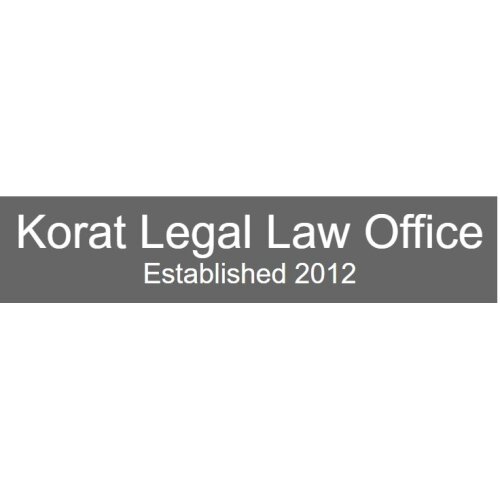Best Energy Regulatory Law Lawyers in Nakhon Ratchasima
Share your needs with us, get contacted by law firms.
Free. Takes 2 min.
List of the best lawyers in Nakhon Ratchasima, Thailand
About Energy Regulatory Law in Nakhon Ratchasima, Thailand
Energy Regulatory Law in Nakhon Ratchasima, as in other parts of Thailand, governs the generation, transmission, distribution, and consumption of energy, particularly electricity and gas. The primary purpose of these laws is to ensure the safe, efficient, and fair provision of energy services, while also supporting national development goals, environmental protection, and consumer rights. Most importantly, these laws set the grounds for licensing, tariffs, dispute resolution, and investment in energy infrastructure. The Energy Regulatory Commission (ERC) is the main regulatory authority at the national level, but provincial and local offices play an important role in addressing local energy challenges and stakeholder concerns in Nakhon Ratchasima.
Why You May Need a Lawyer
Energy Regulatory Law can be complex, and individuals or companies may encounter several scenarios requiring professional legal assistance:
- Securing licenses or permits for setting up energy generation or distribution businesses
- Navigating regulations related to renewable energy projects like solar farms or biomass plants
- Dealing with utility disputes, such as billing issues with state or private energy providers
- Understanding tariff structures, surcharges, and billing disputes
- Complying with environmental and safety requirements linked to energy projects
- Handling land use or zoning issues connected to energy infrastructure
- Participating in regulatory hearings or making formal complaints to energy authorities
- Investing in or acquiring energy assets in Nakhon Ratchasima
Having a lawyer familiar with local energy regulations and procedures can help you understand your rights and options, avoid costly mistakes, and ensure compliance with all legal requirements.
Local Laws Overview
In Thailand, energy regulatory law is primarily governed by the Energy Industry Act B.E. 2550 (2007) and its subsidiary legislation, which applies nationwide, including Nakhon Ratchasima. Key aspects relevant to the local context include:
- All energy producers and distributors must obtain licenses from the ERC. Special rules apply for small renewable installations.
- Energy projects are often subject to Environmental Impact Assessments (EIAs), particularly larger or potentially polluting operations.
- Consumer rights regarding stable supply, transparent pricing, and quality of service are legally protected.
- Local authorities may have further requirements for land use, building permits, or safety checks, especially within Nakhon Ratchasima’s municipalities or industrial parks.
- Tariff rates for electricity and gas are determined by the ERC and are periodically reviewed to balance public interests and investor returns.
- Dispute resolution procedures are established by the ERC, including mediation and, if necessary, administrative appeals.
- Incentives and support schemes may exist for renewable energy projects, such as purchase agreements or reduced regulatory burdens for small producers.
While the central legislation provides the main framework, local implementation and practical issues in Nakhon Ratchasima can vary, especially concerning land use, environmental compliance, and community participation.
Frequently Asked Questions
What is the Energy Regulatory Commission (ERC)?
The ERC is an independent government agency responsible for overseeing and regulating electricity and natural gas businesses in Thailand, including issuing licenses, setting tariffs, and resolving disputes.
Do I need a license for a rooftop solar installation at my home?
Small-scale rooftop solar systems for personal use usually do not require a license, but if you plan to sell electricity back to the grid, certain permits and compliance with safety and technical standards may apply. Always check with local authorities.
How are electricity prices determined in Nakhon Ratchasima?
Electricity tariffs are set by the ERC and applied consistently nationwide, although minor differences may exist depending on provider and consumer category.
Can I challenge a utility bill I believe is incorrect?
Yes, you can file a complaint with your provider first. If unresolved, you can escalate the issue to the ERC or local consumer protection office for investigation.
Is it possible to invest in or operate a renewable energy project in Nakhon Ratchasima?
Yes, both Thai and foreign entities can invest in renewables, subject to licensing, environmental approvals, and compliance with ERC and local government regulations.
What legal steps are involved in developing an energy project?
Typically, the process includes site acquisition or leasing, feasibility studies, obtaining the necessary licenses and environmental approvals, project financing, construction permits, and ongoing regulatory compliance.
What rights do consumers have regarding power outages or poor quality service?
Consumers are entitled to reasonable service quality, timely notification of planned outages, and effective complaints handling. Compensation may be available under certain conditions.
Who regulates natural gas in Nakhon Ratchasima?
The ERC is responsible for regulating natural gas as well as electricity, including licenses and tariff setting for the entire country.
How can legal disputes in the energy sector be resolved?
Disputes can often be resolved through the ERC’s mediation or by lodging formal complaints. For unresolved issues, court action or arbitration may be necessary.
Are there incentives for setting up renewable energy businesses?
Yes, the government provides various support mechanisms for renewables, such as feed-in tariffs, tax benefits, and streamlined licenses, particularly for solar, wind, biomass, and biogas projects.
Additional Resources
For further information or assistance regarding Energy Regulatory Law in Nakhon Ratchasima, consider contacting the following organizations:
- Energy Regulatory Commission (ERC) - The main national body for licensing and regulation
- Provincial Electricity Authority (PEA) - Responsible for electricity distribution in Nakhon Ratchasima
- Office of Natural Resources and Environmental Policy and Planning (ONEP) - For environmental approvals and impact assessments
- Nakhon Ratchasima Provincial Administrative Organization - For local permits and regulatory information
- Local consumer protection offices - For assistance with utility disputes
- Board of Investment of Thailand (BOI) - For investment benefits, particularly in renewables
Next Steps
If you need legal assistance with an energy regulatory matter in Nakhon Ratchasima, Thailand, consider the following steps:
- Identify your specific needs, such as permits, dispute resolution, or investment queries.
- Gather all relevant documents, contracts, or correspondence related to your issue.
- Contact a licensed lawyer with experience in energy regulatory law and familiarity with local procedures.
- Consult with relevant government authorities or agencies for initial guidance.
- Consider arranging a consultation to discuss your situation in detail and outline available legal strategies.
- Stay informed about regulatory changes and follow up on any required filings, deadlines, or compliance obligations.
Remember, early legal advice can prevent problems from escalating and help you achieve the best possible outcome for your case in the complex field of Energy Regulatory Law.
Lawzana helps you find the best lawyers and law firms in Nakhon Ratchasima through a curated and pre-screened list of qualified legal professionals. Our platform offers rankings and detailed profiles of attorneys and law firms, allowing you to compare based on practice areas, including Energy Regulatory Law, experience, and client feedback.
Each profile includes a description of the firm's areas of practice, client reviews, team members and partners, year of establishment, spoken languages, office locations, contact information, social media presence, and any published articles or resources. Most firms on our platform speak English and are experienced in both local and international legal matters.
Get a quote from top-rated law firms in Nakhon Ratchasima, Thailand — quickly, securely, and without unnecessary hassle.
Disclaimer:
The information provided on this page is for general informational purposes only and does not constitute legal advice. While we strive to ensure the accuracy and relevance of the content, legal information may change over time, and interpretations of the law can vary. You should always consult with a qualified legal professional for advice specific to your situation.
We disclaim all liability for actions taken or not taken based on the content of this page. If you believe any information is incorrect or outdated, please contact us, and we will review and update it where appropriate.









